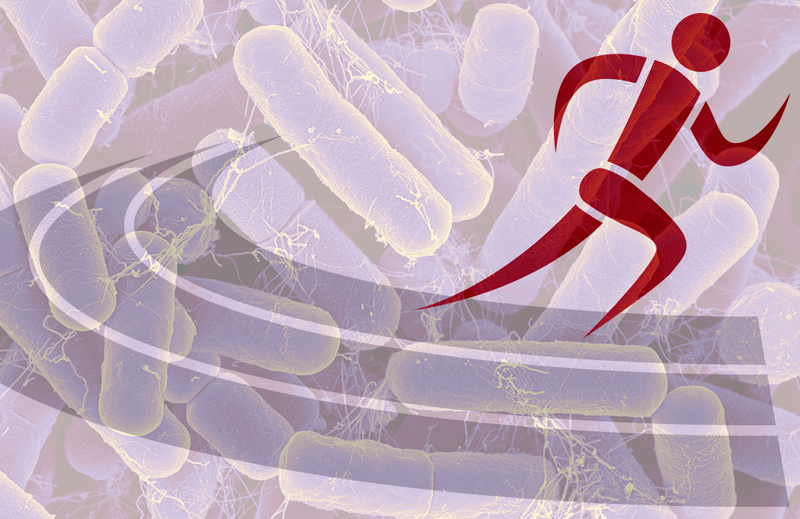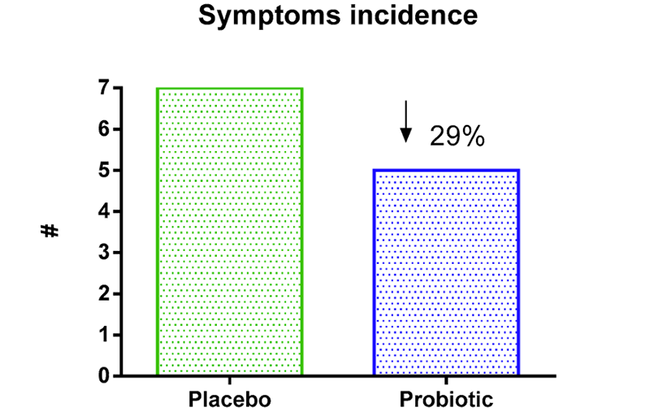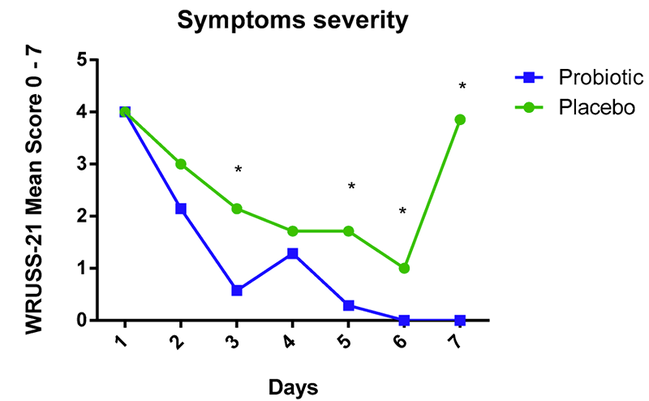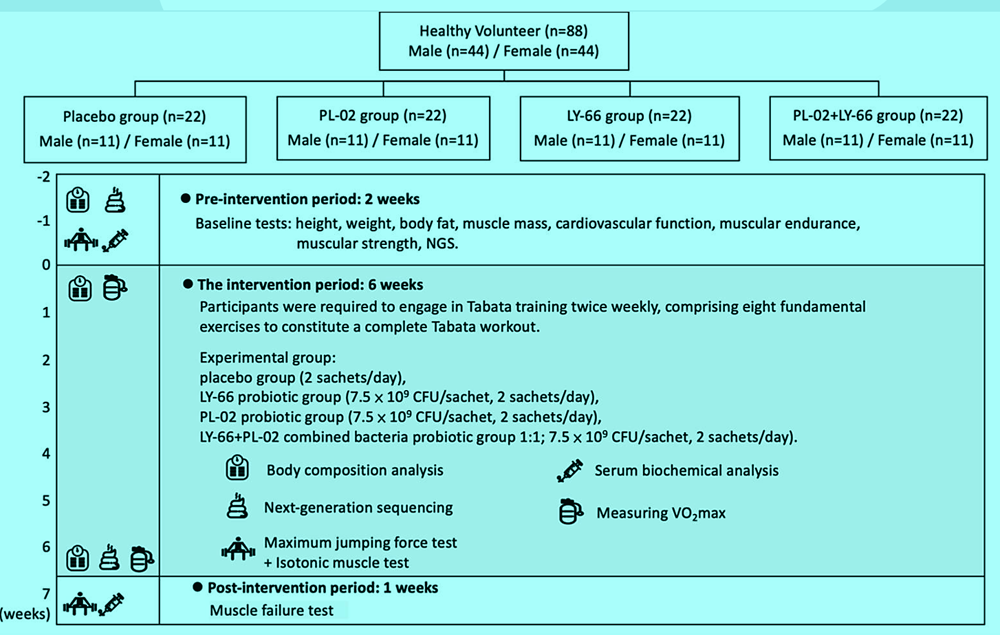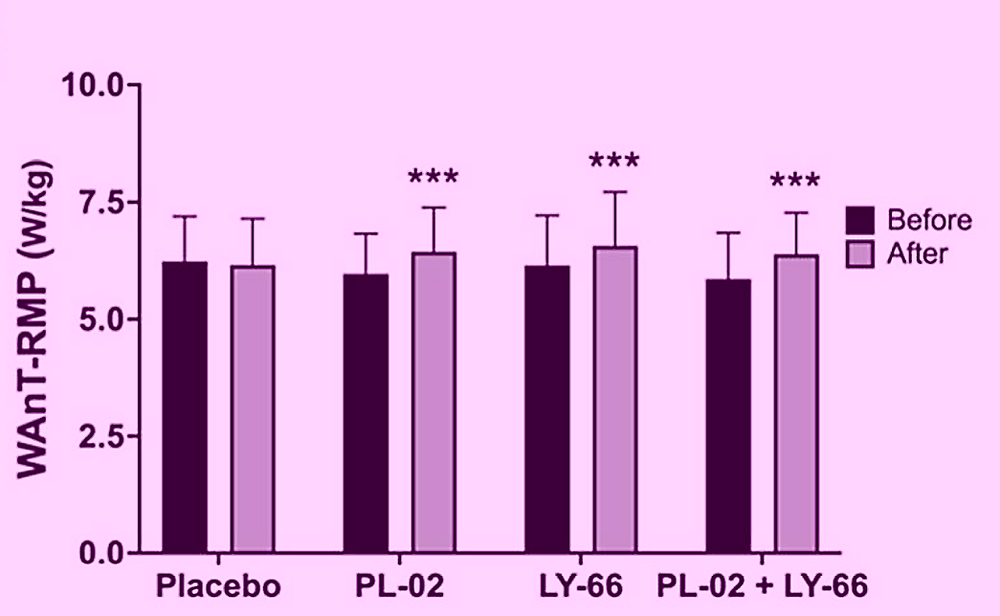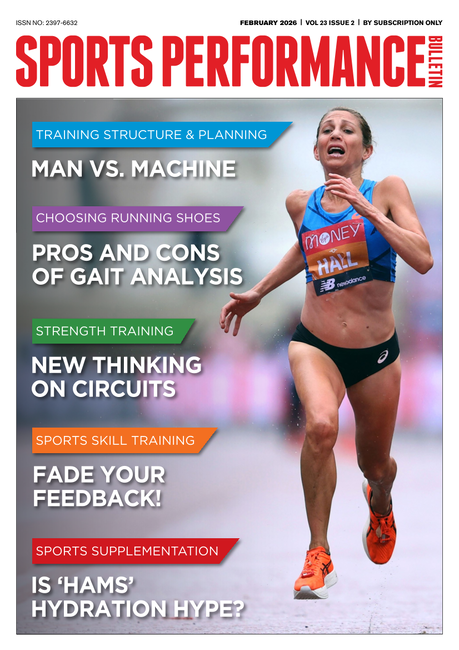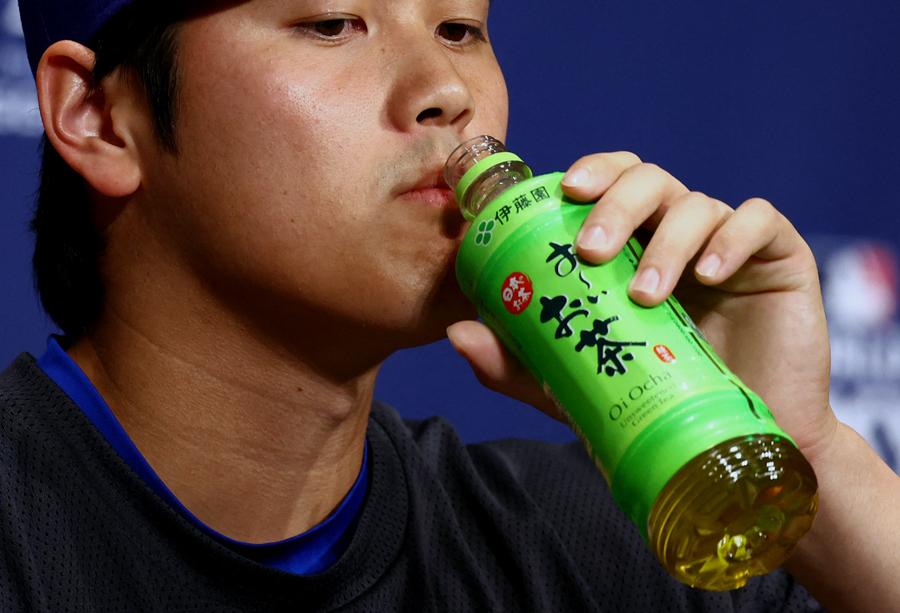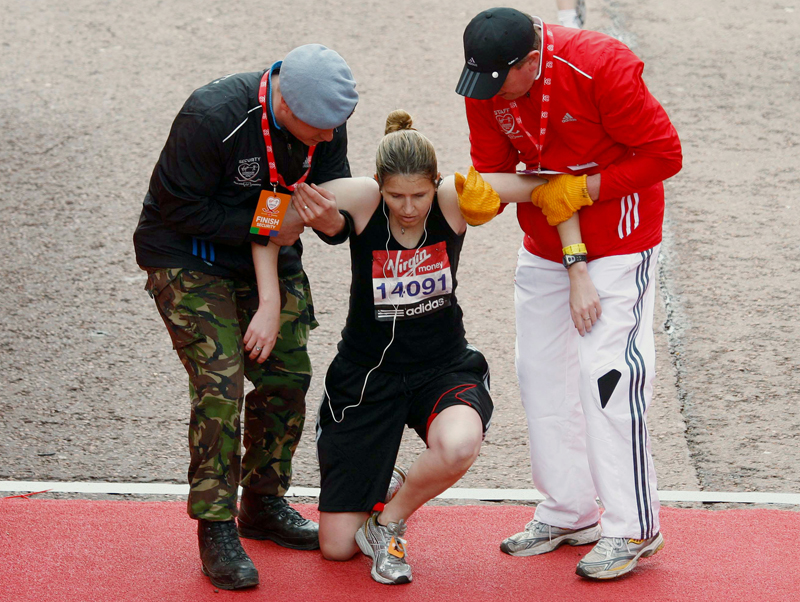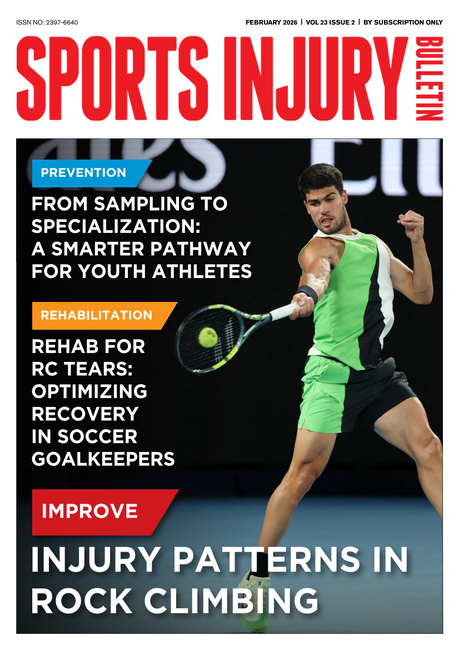You are viewing 1 of your 1 free articles. For unlimited access take a risk-free trial
Athlete health: harnessing the power of microbes!
Probiotics are known to improve gut health and support immunity, but could they also boost exercise performance? SPB looks at new research
When it comes to health and immunity, exercise is something of a double-edged sword. Regular exercise over months and years is now believed to help keep illness and infection at bay by preventing or even reversing the age-related decline in immunity observed in the population at large(1). In the short term however, heavy or prolonged bouts of exercise – eg running a marathon - generates a temporary dip in immunity following the strenuous effort, often referred to as post-exercise immune depression(2). Although this dip in immune function is transitory, it nevertheless creates favorable conditions for viruses and bacterial infections after the effort, especially in the upper respiratory tract(3). This can lead to an increase in the incidence of upper respiratory tract infections (URTIs – coughs, colds, sore throats etc) in the days following the event(3,4).
Nutritional defenses
The good news is that excellent nutrition can mitigate the stress in the immune system generated by exercise. This includes the use of such nutrients such as protein, carbohydrate, amino acids and vitamins/minerals during and after exercise (for a more in-depth discussion, readers are advised to see this article)(5,6). In more recent years however, there’s been an increasing interest in the use of probiotic supplements for enhancing athlete immunity. As we have discussed in previous SPB articles, a growing body of research has demonstrated that the use of probiotic supplementation produces immune and gastrointestinal system benefits. These include:
· An increase in circulating leucocytes (key cellular components of the immune system)(7).
· Stimulation of the maturation of immune cells present in the gut, such as lymphocytes, macrophages, and dendritic cells(8).
· With certain strains of probiotics (eg Lactobacillus casei and Lactobacillus fermentium), a reduced risk of URTIs and flu-like symptoms, and an increase in the concentration of a key immune antibody known as ‘sIgA’ (the body’s first line of defence against pathogens) in gut mucosal tissues(9).
As we also explained in a previous SPB article, these immune effects translate to real-world benefits in those undertaking long or strenuous bouts of exercise. For example, a study published in the journal ‘Nutrients’ investigated the effects of probiotic supplementation on the production of key immune cells and subsequent URTIs after running a marathon(10). It found that marathoners who supplemented with a blend of Lactobacillus acidophilus, Lactobacillus paracasei, Lactococcus lactis, Bifidobacterium animalis, and Bifidobacterium bifidum for 30 days before a marathon mounted a stronger and more targeted immune response after their marathon efforts than those who didn’t. Importantly, this resulted in a lower incidence of URTI symptoms and severity in the probiotic-supplemented runners in the following week (see figures 1a and 1b).
Figures 1a (top) and 1b (bottom): Symptom incidence and severity in probiotic vs. placebo athletes
The power of bugs
When we talk about ‘gut health’, gut flora’, or ‘gut microbiota’, what we are talking about is a vast number of friendly bacteria that live in our gut in a ‘symbiotic’ relationship. In very simple English, we provide these bacteria a warm home and feed them, while in return, they churn out a variety of biological compounds that benefit our health – a win-win arrangement if there ever was one! Make no mistake, these bacteria are a major component of the gut. The average human gut contains around 100 trillion of these different types of friendly bacteria, which is approximately ten times the number of bacterial cells compared to the total count of human cells(11). The total number of genetic instructions that these bacteria are capable of is 150 times larger than the human body can muster, explaining why they can benefit our metabolism in so many ways.
While the link between gut health, probiotic use and improved immunity is now widely accepted, our improving understanding of what and how friendly bacteria can synthesize biologically useful compounds has prompted scientists to ask more questions about probiotic use. In the context of sport performance, the past five years or so has seen an increase in research on gut health and muscle function. In particular, a number of scientists have proposed the concept of something called the ‘gut–muscle axis’ - a connection between the gut microbiota and muscle cells. In particular, it is believed that within the gut microbiota (the whole population of microbes that live in the gut) there are some key classes of bacteria (Firmicutes, Bacteroidetes, Proteobacteria, and Actinobacteria) that play a role in producing beneficial nutrients such as short-chain fatty acids (a good fuel for muscle cells during exercise!)(12,13).
Real-world benefits
This research is not just theoretical. A study on exercise-induced muscle damage and recovery found that supplementing a probiotic strain called Bacillus coagulans demonstrated potential in reducing exercise-induced muscle damage following hard exercise(14). Another study focused on a probiotic strain isolated from humans, Bifidobacterium longum, which was found to enhance endurance running distance in middle and long-distance runners(15). Furthermore, in a study by the same team of scientists, it was found this same probiotic strain was associated with increased muscle grip strength and a reduction in perceived fatigue induced by exhaustive exercise(16).
Another fascinating study took a ‘reverse-process’ approach. The gut flora of an Olympic weightlifting gold medallist was analyzed and two strains of bacteria - Lactococcus lactis and Lactobacillus plantarum were found to be particularly prevalent. The researchers then took some mice and supplemented them with these two probiotic strains, whereupon it was found that the probiotics significantly elevated grip strength and endurance in the mice. In their study, the scientists proposed that the performance benefits likely involved improved fatty acid metabolism and increased glycogen storage levels in the liver and muscles, which then led to enhanced exercise performance in the mouse model(17).
New research
If the right kind of probiotics can help improve performance, and if certain types of friendly bacteria found in elite athletes are able to improve performance in mice when given as a supplement, could these same probiotics lead to improved human performance when given as a supplement? A new study by a team of Taiwanese researchers has tried to answer this very question(18). Published in the journal ‘Nutrients’, this study investigated the effects of individual and combined supplementation of Lactococcus lactis and Lactobacillus plantarum (precise strains used were Lactococcus lactis subsp. lactis LY-66 and Lactobacillus plantarum PL-02) on exercise performance, resilience to post-exercise muscle strength loss, and gastrointestinal health.
What they did
Eighty eight healthy, active participants were recruited and randomly divided into 4 groups of 22 people in each group (half male and half female). These were as follows:
· Lactococcus lactis LY-66 probiotic group: two sachets per day in 250mls of water, with each sachet containing 7.5 billion colony forming units [CFUs] per sachet.
· Lactobacillus plantarum PL-02: two sachets per day in 250mls of water, with each sachet containing 7.5 billion colony forming units [CFUs] per sachet.
· A blend of LY-66 and PL-02: two sachets per day in 250mls of water, with each sachet containing 7.5 billion colony forming units [CFUs] per sachet.
· An inert placebo: two sachets per day in 250mls of water that looked and tasted the same as the probiotic drinks but which contained no probiotics.
The study period lasted six weeks, during which the participants underwent twice-weekly training while supplementing one of the four formulas above according to their group assignment. Training consisted of very intense circuit-type workouts using a Tabata work/rest structure (20 seconds on, 10 seconds off). Each session included squats, push-ups, lunges, high knees, spiderman planks, leg raises, plank jacks, and abdominal crunches. Each exercise was performed for 20 seconds followed by a 10-second rest. The complete workout comprised one set of these eight exercises and all subjects were required to train twice a week for a total of six weeks - ie a total of 12 times.
What they measured
Before, during the 6-week intervention and again at the end of the intervention, all the participants underwent various tests to assess key areas of physical performance. These included body composition analysis, countermovement jump assessment, local muscular endurance testing (using repeated jumping), anaerobic capacity (maximum power output during a maximal 30-second sprint test on a bike), and aerobic capacity (maximum oxygen uptake [VO2max] measured using incremental testing on a treadmill. In addition, blood samples were taken to track any metabolic changes and fecal testing was also carried out to see if and how the gut flora changed over time. A summary of the overall intervention protocol is shown in figure 2.
Figure 2: Summary of the intervention and testing protocol
What they found
The results showed that compared to the placebo group taking inert sachets, those taking either strain of probiotics or the probiotic blends gained a number of significant performance benefits. In particular, the combination of exercise training and supplementation with PL-02, LY-66, and PL-02+LY-66 significantly enhanced muscle strength, explosive power, and endurance performance compared to training alone. The probiotic supplementation protocol was also found to effectively attenuate the decline in muscle strength and explosive power following exercise-induced muscle damage and soreness, reduce the elevation of inflammatory markers in the blood, and accelerate the post-exercise recovery process. Notably, the intake of PL-02 significantly increased muscle mass, while the consumption of LY-66 and the combined PL-02+LY-66 formulation led to a substantial reduction in body fat percentage. Figures 3 and 4 show the findings for maximal aerobic power and maximal average anaerobic power respectively.
Figure 3 (top): Probiotic supplementation and maximal oxygen uptake; Figure 4 (bottom): Probiotic supplementation and 30-sec sprint power
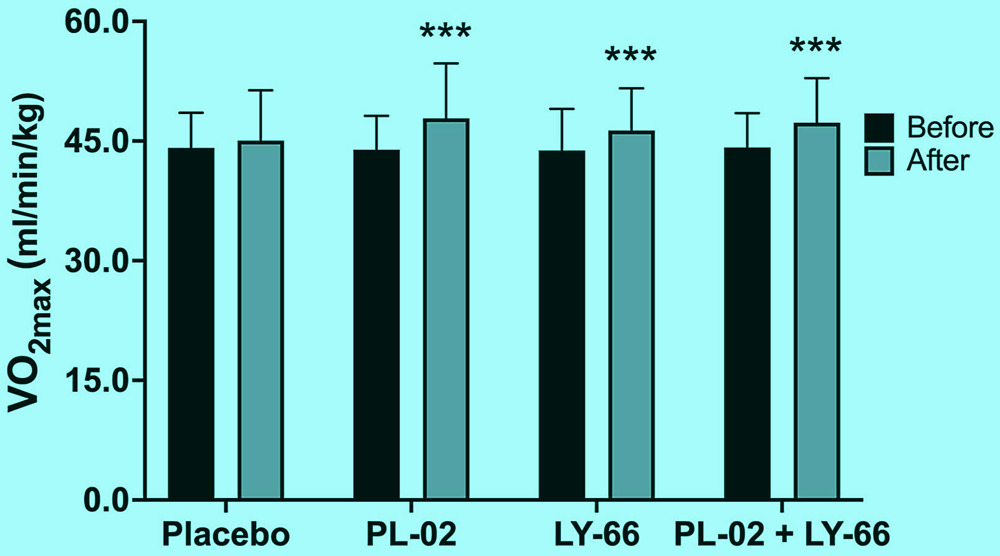
Bars show maximum average power in watts per kilo of bodyweight during a 30-second cycling sprint. Black bars = before; pink bars = after. Triple asterisks denote a significant improvement between before/after. Both probiotics and the combination resulted in significant gains in maximum mean power per kilo compared to placebo.
Practical implications for athletes
These results strongly suggest a link between gut health, muscle growth and muscle-related performance, which is of special interest to athletes. Interestingly, while much of the focus on probiotic use and gut health has focussed on athlete immunity, there’s solid evidence that gut health also affects muscle tissue and function. For example, previous animal investigations have found a correlation between gut microbiota and muscles, suggesting that a deficiency in gut microbiota may lead to loss in muscle mass(19,20). Moreover, the fecal tests in this most recent study found that in the probiotic-supplement groups, there was a significant increase in Lactobacillus plantarum and butyric acid-producing Lachnospiraceae.
Butyric acid is a short chain fatty acid commonly produced by fermentation in a gut that is populated by healthy bacteria. In the colon, butyric acid is known to help promote bacterial equilibrium, attenuate inflammatory responses, and maintain intestinal barrier integrity (ie makes it less ‘leaky’)(21,22). Furthermore, in patients with inflammatory muscle diseases, a decrease in butyrate-producing bacteria in the gut has been observed(23), while butyrate synthesis by gut microbes has been shown to increase skeletal muscle mass in healthy menopausal women(24).
Taking the evidence as a whole, the evidence suggests that athletes should consider maintaining good gut health as an essential part of any nutrition strategy – not just to help maintain immunity during the winter months, but for performance overall. In this study, both the Lactococcus lactis and Lactobacillus plantarum probiotics were effective at boosting performance, with Lactobacillus plantarum being particularly effective for building muscle mass and the combination of Lactococcus lactis and Lactobacillus plantarum being effective for improving body composition via fat loss. For athletes wanting to improve gut health therefore, a combination of probiotics that contain both these species, along with other species that have been shown to enhance immunity (such as Lactobacillus fermentum and Lactobacillus casei) is likely your best bet. It’s important however to understand that while probiotic supplements can help, diet and lifestyle are also important for maintaining gut health. Below are some tips for making sure your gut health is the best it can be!
· Consume a whole unprocessed diet and be sure to include foods such as garlic, onion, chickpeas, lentils, oats, beans, artichoke, banana, and leeks, which contain special fibres that good gut bacteria love to feed on.
· If you enjoy yogurt, choose a live, natural variety, which contains healthy bacteria.
· Use a blend of bacteria strains that have proven to be effective in studies such as those mentioned above and also Lactobacillus fermentum and Lactobacillus casei, and ensure the dose is 5bn CFUs or more per strain.
· Take any probiotic on an empty tummy and at least 15 minutes before food. A good time is soon after rising in the morning, but before breakfast.
· If you have a choice, bear on mind that probiotics in liquid form are more likely to be effective than dried forms such as capsules.
· Remember that beneficial changes in gut flora from probiotic supplementation take time to accrue, which means that probiotics are not a ‘quick fix’ for boosting performance or immunity.
· Only use antibiotics (which wipe out healthy bacteria from the gut) when you absolutely have to. Probiotics should be considered as essential following a course of antibiotic treatment.
References
1. Front Immunol. 2021 Apr 16;12:639308
2. Sports Med. 2007, 37, 412–415
3. J. Sci. Med. Sport 2010, 13, e85–e86
4. J. Sports Med. 1997, 18, 91–100
5. Nutr. Rev. 2008, 66, 310–320
6. Exerc. Immunol. Rev. 2017, 23, 8–50
7. Br. J. Sports Med. 2006, 40, 351–35
8. Exerc. Immunol. Rev. 2015, 21, 70–79
9. Synth. Syst. Biotechnol. 2018, 3, 113–120
10. Nutrients. 2021 Apr 27;13(5):1478
11. Nutrients. 2020;12:1451
12. Nat. Med. 2019;25:1104–1109
13. Nutrients. 2017;9:1303
14. PeerJ. 2016;4:e2276. doi: 10.7717/peerj.2276
15. Nutrients. 2020;12:1972
16. Nutrients. 2020;12:1145
17. Nutrients. 2022;14:1270. doi: 10.3390/nu14061270
18. Nutrients. 2024 Jun; 16(12): 1921
19. Front. Med. 2023;9:1065365
20. Oxidative Med. Cell. Longev. 2022;2022:215119
21. Am. J. Pathol. 2023;193:1455–1467
22. Clin. Chim. Acta. 2020;507:236–241
23. Int. Immunopharmacol. 2023;124:111001
24. J. Cachexia Sarcopenia Muscle. 2021;12:1860–1870
Newsletter Sign Up
Testimonials
Dr. Alexandra Fandetti-Robin, Back & Body Chiropractic
Elspeth Cowell MSCh DpodM SRCh HCPC reg
William Hunter, Nuffield Health
Newsletter Sign Up
Coaches Testimonials
Dr. Alexandra Fandetti-Robin, Back & Body Chiropractic
Elspeth Cowell MSCh DpodM SRCh HCPC reg
William Hunter, Nuffield Health
Keep up with latest sports science research and apply it to maximize performance
Today you have the chance to join a group of athletes, and sports coaches/trainers who all have something special in common...
They use the latest research to improve performance for themselves and their clients - both athletes and sports teams - with help from global specialists in the fields of sports science, sports medicine and sports psychology.
They do this by reading Sports Performance Bulletin, an easy-to-digest but serious-minded journal dedicated to high performance sports. SPB offers a wealth of information and insight into the latest research, in an easily-accessible and understood format, along with a wealth of practical recommendations.
*includes 3 coaching manuals
Get Inspired
All the latest techniques and approaches
Sports Performance Bulletin helps dedicated endurance athletes improve their performance. Sense-checking the latest sports science research, and sourcing evidence and case studies to support findings, Sports Performance Bulletin turns proven insights into easily digestible practical advice. Supporting athletes, coaches and professionals who wish to ensure their guidance and programmes are kept right up to date and based on credible science.
